“The Arab World and the US: Interests and Concerns in a Changing Environment (An Academic Perspective)” closed on Monday, June 16, bringing to a close three days of intense deliberations on the past, present, and prospective futures for relations between the US and Arab countries. The final session of the three-day conference was a roundtable discussion, including speakers such as former US ambassador Richard Murphy, researcher Daniel Serwer, Arab political thinkers Raghid al-Solh and Haifa Zangana, and Egyptian activist Najwan al-Ashwal. Khalil Jahshan, a long-standing activist in the Arab-American community and independent scholar, announced during this final roundtable that the ACRPS planned to open a satellite office in Washington, DC. Giving the ACRPS a North American presence would serve, said Jahshan, to increase the scope and improve the quality of Arab scholarship on the United States. The ACRPS would be joining the more than 1,600 think tanks and policy institutes based in the US capital, and would introduce American policy-makers to research from the Arab world.
In the sessions preceding the final closing roundtable, there were a multitude of controversial topics being discussed. Though relations between the US and the Arab world extend back to the 19th century, the two most pressing topics for discussion at the conference were Palestine and Iraq.
How US Policy on Palestine Harms both the Arabs and the United States
Speaking on the final day of the conference, writer and Al Jazeera broadcaster Marwan Bishara offered that when the US decided on its policy toward Palestine and the Middle East, it balanced its domestic politics needs and its national security interests; in other words, the loyalty of US congressional legislators and presidential candidates stood at odds with the country’s national security needs. Presenting his paper, “Palestine in US Foreign Policy,” and making specific mention of President Obama’s first presidential bid in 2004, Bishara commented that, in most cases, the triumph of US domestic concerns meant that both the US and the Palestinians suffered.
Osama Abu Irshaid, a non-resident ACRPS scholar currently based in the US, offered a different perspective on this topic. While he agreed that the US has a long-standing bias in favor of Israel contrary to its own interests, he noted that President Obama has applied unprecedented pressure on Israel. His reasons for doing so, according to Abu Irshaid, were three-fold: Obama’s ideological and political past; his desire to secure a legacy where previous US presidents had failed; and a growing realization among policy-makers, defense officials, and intelligence operatives in the US that the lack of a resolution to the Middle East conflict in a manner that pleased both sides was detrimental for the US’s vital interests. Israeli intransigence and the influence of its backers on US policy formation, however, have made it nearly impossible to achieve his aims in resolving the Palestinian-Israeli conflict before the end of his second term.
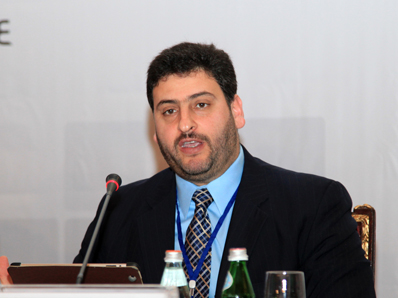 |
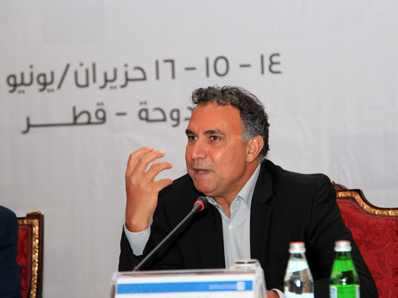 |
| Osama Abu Irshaid |
Marwan Bishara |
Left-to-right:Osama Abu Irshaid, Marwan Bishara.
US Foreign Policy and the Desire to Maintain Calm in the Countries Untouched by the Arab Spring
David Pollock, speaking during the first sessions of the conference, suggested his belief that the US was much less powerful than was believed in the region; contrary to conspiracy theories, which Pollock described as widespread throughout the Arab region, the US’s ability to influence the course of events is limited. Accordingly, most American actions in the Middle East and beyond were limited to defensive and retaliatory measures. A number of realities make this especially true, including a sense of apathy and weariness toward war and foreign engagement among the US Congress, the presidency, and the general public; a general preoccupation with more pressing domestic social and economic concerns; and what Pollock described as an unusual partisan polarization that extends even to foreign policy, an area where there has been a traditional bi-partisan consensus.
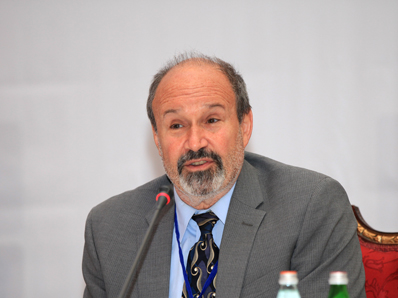
David Pollcock addressing the conference.
Pollock suggested that the US is implicitly being asked to help those Arab states unaffected by the Arab Spring to remain so by providing economic aid and diplomatic support. Most important, he felt that the US government should refrain from making public demands for democratic reform in these countries. US foreign policy has progressed in a way that is uneven and self-contradictory across a number of issues, and these contradictions, he suggested, are the result of tension between ideals and interests. In the case of Syria, this manifested in counterbalancing humanitarian idealism against the need to satisfy the strategic imperatives of cooperating with the Kurds, Iraq, Turkey, and even Iran. This could also be seen in Egypt, where declared support for democracy at the outset of the anti-Mubarak revolution turned into a pragmatic concern for security interests after July 2013.
This viewpoint was echoed by Lebanese researcher Ghassan al-Izzi, who pointed out that the American reaction to the Arab Spring varied from one country to the next, in stark contrast to the US’s approach to the Velvet Spring that shook post-Communist Eastern Europe. He described the US’s reaction to the Arab Spring as “excessively pragmatic,” noting that this meant the US was adaptable to any and all changes. In Egypt, the US was willing to adapt to the rise of the Muslim Brotherhood, followed by their later acceptance of the group’s fate. The US did not approach the Egyptian Revolution as a democratic movement that demanded its support the way it did in Eastern Europe. Al-Izzi cited familiar reasons for this response: Israeli interests and the differing domestic and international circumstances between the Reagan and Obama presidencies. More specific to the Arab Spring was the fact that there were a number of metanarratives struggling for dominance—Islamist, secular, nationalist and others— in Arab countries, in contrast to the former Eastern Bloc countries, all of which sought a Western model of liberal democracy.
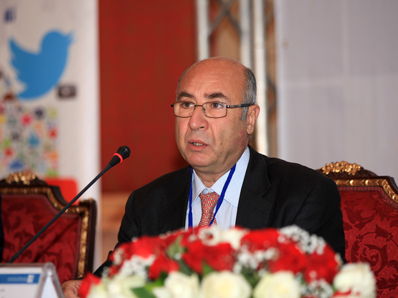
Ghassan al Izzi speaks at the ACRPS conference.
The topic of US ambiguity toward the uprisings of the Arab Spring was also covered by Radwan Ziada, a scholar and a member of the Syrian opposition, who pointed out that the Americans had two seemingly contradictory viewpoints regarding the Syrian Revolution; though they feared a victory for al-Assad would see the rise of Iran and Hezbollah, they were equally unprepared to see the opposition achieve a full-blown military victory.
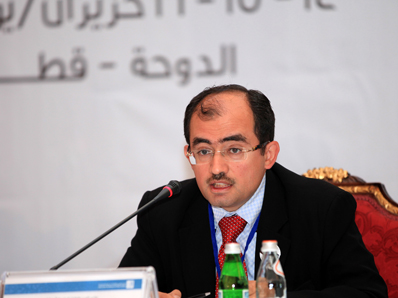
Member of the Syrian opposition and researcher, Radwan Ziada.
This conference was the latest in a series of ACRPS conferences organized to take a closer look at relations between the Arab region and a selected interlocutor. Previous conferences include events which examine the relations between the Arabs and Iran; the Arabs and Turkey; and the Arabs and the Horn of Africa.
More details of the conference can be found on its Event page.